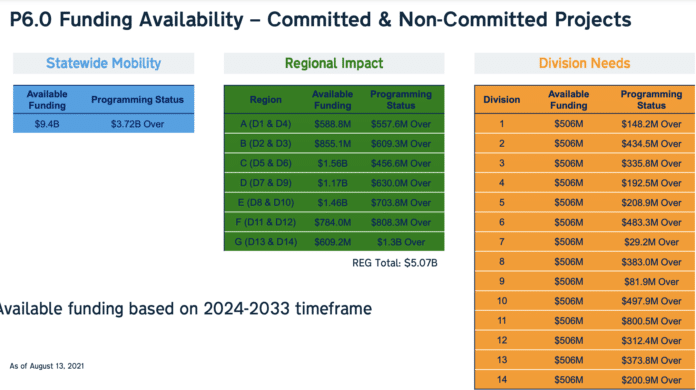The North Carolina Department of Transportation (NCDOT) has planned $7 billion more in road construction projects than it can afford according to recently reworked cost estimates.
The overrun has forced a detour in the state’s long-run planning process and sparked concerns that new projects won’t be added in the coming years and that currently planned projects may be dropped, WRAL-TV reported on Sept. 22.
More than 1,000 projects listed in the State Transportation Improvement Program (STIP) are routinely reviewed, but the latest NCDOT estimates show an extreme overrun based on the numbers for 2024 to 2033, the latest DOT estimates indicate.
Worse, the $7 million overrun only accounts for “committed” projects over that timetable, a designation that generally means they’re expected to start in the first six years of the plan. If you include all the non-committed plans in later years. Add non-committed new estimates run $13.3 billion above what was already supposed to be a $24 billion plan, the broadcaster reported.
“It is a problem,” Joey Hopkins, WRAL quoted the department’s deputy chief engineer for planning as saying earlier in the month.
Part of the issue is a revenue shortfall. The federal gasoline tax rate hasn’t increased since 1993. While state lawmakers changed the tax rules in 2015 to allow for inflation and population increases, the shift to electric vehicles suggests that the shortfall will increase in upcoming years.
An appointed commission, co-chaired by former Raleigh Mayor Nancy McFarlane and Howard Nye, chief executive officer of Martin Mariatta, which supplies concrete and other road building materials, issued a report in January saying the state needs to increase its transportation spending by at least $20 billion over the next 10 years.
Its recommendations include:
- Increase the current 3 percent tax on vehicle sales to 5 percent
- Increase the state sales tax
- Tax transportation network companies like Uber and Lyft
- Increase the state’s fee on electric vehicles and create one for hybrids
- Charge delivery fees on goods bought online
- Experiment with a pay-per-mile program that would track how far people drive
- Toll more roads
WRAL reported:
The project cost increases revealed over the last few months stem from a routine re-estimation that came during a global pandemic that upset supply chains, raising material costs, and roiled labor markets, raising those costs as well. Real estate prices in North Carolina are going up, too, boosting the costs DOT expects to pay in the coming years to buy property to build or widen roads.
“What we’re dealing with now in our market … the cost increases we’re dealing with now are unprecedented,” Hopkins told the broadcaster. “The housing market, our right-of-way costs, sometimes seem to be going up daily.”
Hopkins says the NCDOT is solvent with almost $2 billion in the bank and current projects within the next three years shouldn’t be affected. The issue is with project planned for later, and he said the department is talking to local leaders around the state about scaling projects back to save money without eliminating projects.
A DOT working group will also put together a methodology to decide what planned items may get dropped. “We want to have a transparent and fair process,” Hopkins said.
There is time to figure things out. The next transportation plan isn’t due until December, 2022 in draft form, and it won’t likely be approved by the state Board of Transportation until the summer of 2023, Hopkins said. Prices could decline in that time.
“I just want to reiterate: We’ve got time to work this out,” Hopkins said. “We need to have a document that people can believe in when they look at it.”

